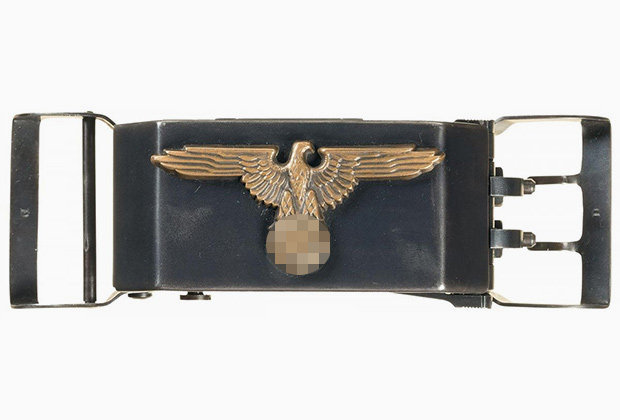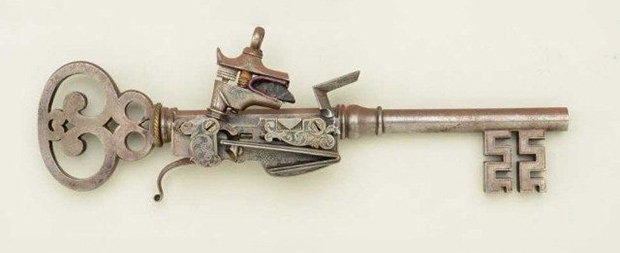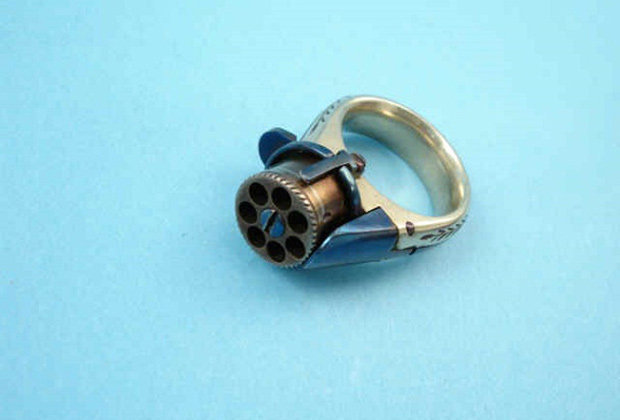The Bond Arsenal
Pistol rings, shooting keys, cigarette cases, and belt buckles – all these goofy gadgets are part of the traditional arsenal of secret agents and spy flicks. In fact, such weapons and gadgets appeared long before the first Bond movie came along in 1962.
SS belt buckle

The camouflaged devices were initially designed as a “last chance†means of protection against criminals. However, with the efficiency of such gadgets leaving much to be desired, wealthy citizens preferred more traditional Derringer pistols, canes with a sword hidden inside or just a whip.
Physical Gold Silver in your IRA. Get the Facts.
A key gun
Keys were one of the first everyday objects to be converted to pistols as their hollow shaft could serve as a barrel. The oldest such weapon with a flintlock dates back to the 16th century.
Key

Arms designers of old even managed to install a 3mm pistol inside an otherwise inconspicuous pocket watch. A 19th-century version switched the regular pinions and springs for a primitive trigger and a tiny barrel.
Small caliber “death ringsâ€
The ring gun, a revolver mounted to a piece of hand jewelry, was very much in vogue in Europe during 1860-1870s. One such tiny pistol – a British-made seven shooter called “Femme Fatale†used 3.5-4.4mm bullets. To load, unload, or reload the handgun, the user had to take a small slotted jewelers screwdriver and remove the cylinder from the ring base.
SS belt buckle and Stalin’s grenade launcher
The Second World War gave camouflaged firearms a new lease on life. The SS belt buckle pistol (SS-Waffenakademie Koppelschlopistole) was arguably the best known such weapon. Designed by engineer Luis Marquis in 1942, it was an experimental firearm consisting of two or four 7.62mm or 5.6mm barrels and lockwork concealed within a Nazi belt buckle.
The barrels were 2″ long and the wearer needed to be very close to their target. After a lever was pressed, the spring-loaded buckle would pivot downwards, exposing the barrel.
The Nazi’s even developed portable grenade launcher designed expressly to kill Soviet leader Josef Stalin. The “Panzerknacke†was a 20mm steel tube strapped to the shooter’s right arm.
It fired rocket-propelled grenades capable of piercing a 30mm armor plate 30 meters away.
In 1944, Soviet NKVD agents confiscated one such Panzerknacke with nine grenades from a team of Nazi assassins on a mission to kill Stalin.
US Stinger and a sling gun
During the early 1940s, the US Office of Strategic Services (the forerunner of the CIA) came up with a flurry of strange looking shooting devices. One, called Little Joe, was a crossbow gun designed to take out sentinels and guard dogs without making any noise.
OSS armorers also came up with the Stinger single-shot shooting pen, which fired 5.6mm and 6.35mm Browning bullets and had an effective range of up to three meters. According to various estimates, some 40,000 Stingers were built during WWII.
Femme Fatale ring gun

© PHOTO: GREGG MARTIN AUCTIONS
Three-barreled silent cigarette case
The start of the Cold War forced arms designers on both sides of the Atlantic to devise grenade launching umbrellas, exploding radios, sleeve guns, etc. While many of these designs remained on paper, some eventually reached the factory floor.
During the 1950s, the Soviet KGB enlisted a team of engineers to design silent weapons to kill enemy agents. In 1955, Igor Stechkin designed a three-barreled cigarette case firing that fired 9mm low-noise bullets up to seven meters away.
The shooting cigarette case was eventually approved for use by Soviet secret agents, but whether it was actually put to use remains anyone’s guess.
Other weapons than guns have been used to kill, including a cyanide gas gun used by KGB officer Bogdan Stashinsky to assassinate two Ukrainian dissidents — Lev Rebet and Stepan Bandera.
A poison-tipped umbrella was used to kill Bulgarian dissident Georgi Markov in London in 1978.
Reprinted from Sputnik News.